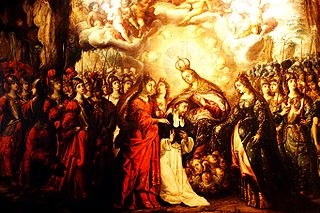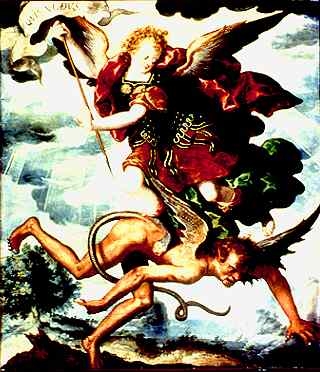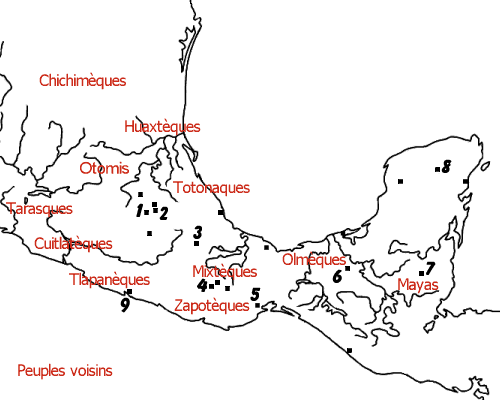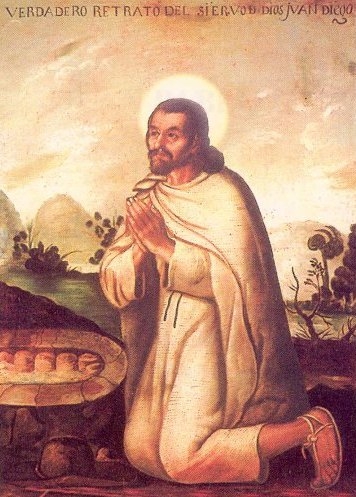Mexique (Documents)
Documents concernant le Mexique (16ème-19ème)
Quatre Peintres du 17ème
(Lactation de Santo Domingo)

Juan Correa
Luis Juárez (1585-1638)

--------------------------------------------------------------------------------------------------------------
Mexico-Tenochtitlan: Mémoire "Mexico: illustrations et analyses diverses permettant de visualiser la situation de la ville, l'architecture...
16ème
Paul III: Veritas ipse (2-6-1537)
Fray Bernardino de Minaya y la "Sublimis Deus" (texte espagnol adressé au Pape par Fray Bernardino)
Fray Bernardino de Sahagun et le codex de Florence
Bibliographie+courts extraits
17ème siècle
La Virgen de la Macana: Article de Llona Katzew
La Virgen de la macana, emblema de una conyuntura franciscana (1998)
Daniele Dehouve: Le Christ et le plumassier (l'art de la légèreté)
Jean-Marie Leclezio - Levi-Strauss (Apostrophes 1988, 10 mn)
Jean-Marie Leclezio - Levi-Strauss (Apostrophes 1988, 10 mn)
Pierre Ragon: les saints et les images du Mexique, L'Harmattan, 2003
--------------------------------------------------
Sublimis Deus (latin)
Paulus Papa tertius universis Christi fidelibus præsentes litteras inspecturis salutem et Apostolicam benedictionem. Sublimis Deus sic dilexit humanum genus, ut hominem talem condiderit qui non solum boni sicut cæteræ creaturæ particeps esset, sed ipsum Summum Bonum inaccesibile et invisibile attingere et facie ad faciem videre posset; et cum homo ad vitam et beatitudinem æternam obeundam, etiam sacrarum literarum testimonio, creatus sit, et hanc vitam et beatitudinem æternam, nemo consequi valeat, nisi per fidem Domini nostri Jesu Christi fateri necesse est, hominem talis conditionis et naturæ esse, ut Fidem Christi recipere possit, et quemqunque, qui naturam hominis fortitus est, ad ipsam Fidem recipiendam habilem esse. Nec enim quisque adeò desipere creditur, ut se secredat Fidem obtinere posse, et medium summe necessarium, nequaquam attingere.
Hinc veritas ipsa quæ nec falli, nee fallere potest, cum prædicatores fidei ad officium prædicationis destinaret, dixisse dignoscitur. Euntes, Docete Omnes Gentes. Omnes dixit, absque omni deletu, cum omnes fidei disciplinæ capaces existant. Quod videns ipsius humani generis emulus qui bonis operibus, ut pereant semper adversatur, modum excogavit ac temis in auditum, quo impediret, ne verbum Dei gentibus salve fierent, predicaretur, ac quosdam suos satelites commovit, qui suam cupiditatem ad implere, cupientes occidentales, et meridionales Indos, et alias gentes, quas temporibus istis ad nostram notitiam pervenerunt, sub prætextu, quod Fidei Catolicæ expertes existant, uti muta animalia ad nostra obsequia redigendos esse passim asserere præsumat.
Nos igitur qui eiusdem Domini Nostri vices, licet immeriti, gerimus in terris, et oves gregis sui nobis commissas, quæ extra eius ovile sunt, ad ipsum ovile toto nixu exquirimus. Attendentes Indos ipsos, ut potè veros homines, non solum Christianæ Fidei capaces existere, sed ut nobis innotuit, ad fidem ipsam promptissimè currere. Ac volentes super his congruis remediis providere, prasdictos Indos et omnes alias gentes ad notitiam Christianorum imposterum deventuras, licet extra Fidem Christi existant sua libertate àc rerum suarum dominio privatos, seù privandos non esse. Imò libertate et dominio huiusmodi, uti et potiri, et gaudere, liberè et licitè posse, nee in servitutem redigi debere. Ac si secùs fieri contigerit irritum et innane. Ipsosque Indos et alias gentes verbi Dei prædicatione et exemplo bonæ vitæ ad dictam Fidem Christi invitandos fore, et præsentium literarum transumptis manu alicuius Notarii publici subscriptis, àc sigillo alicuius personæ in dignitate Ecclesiastica constitutæ munitis, eamdem fidem adhibendam esse, quas originalibus adhiberetur auctoritate Apostolice per præsentes litteras decernimus et declaramus. Non obstantibus præmissis, cæterisque contrariis quibuscumque.
Datum Romæ Anno Domini millessimo quingentessimo trigessimo septimo. Quarto nonas Junii Pontificatus nostri, Anno tertio.
Sublimis Deus (Anglais)
Paul III Pope To all faithful Christians to whom this writing may come, health in Christ our Lord and the apostolic benediction.The sublime God so loved the human race that He created man in such wise that he might participate, not only in the good that other creatures enjoy, but endowed him with capacity to attain to the inaccessible and invisible Supreme Good and behold it face to face; and since man, according to the testimony of the sacred scriptures, has been created to enjoy eternal life and happiness, which none may obtain save through faith in our Lord Jesus Christ, it is necessary that he should possess the nature and faculties enabling him to receive that faith; and that whoever is thus endowed should be capable of receiving that same faith. Nor is it credible that any one should possess so little understanding as to desire the faith and yet be destitute of the most necessary faculty to enable him to receive it. Hence Christ, who is the Truth itself, that has never failed and can never fail, said to the preachers of the faith whom He chose for that office "Go ye and teach all nations." He said all, without exception, for all are capable of receiving the doctrines of the faith.
The enemy of the human race, who opposes all good deeds in order to bring men to destruction, beholding and envying this, invented a means never before heard of, by which he might hinder the preaching of God's word of Salvation to the people: he inspired his satel?lites who, to please him, have not hesitated to publish abroad that the Indians of the West and the South, and other people of whom We have recent knowledge should be treated as dumb brutes created for our service, pretending that they are incapable of receiving the catholic faith.
We, who, though unworthy, exercise on earth the power of our Lord and seek with all our might to bring those sheep of His flock who are outside, into the fold committed to our charge, consider, however, that the Indians are truly men and that they are not only capable of understanding the catholic faith but, according to our information, they desire exceedingly to receive it. Desiring to provide ample remedy for these evils, we define and declare by these our letters, or by any translation thereof signed by any notary public and sealed with the seal of any ecclesiastical dignitary, to which the same credit shall be given as to the originals, that, notwithstanding whatever may have been or may be said to the contrary, the said Indians and all other people who may later be discovered by Christians, are by no means to be deprived of their liberty or the possession of their property, even though they be outside the faith of Jesus Christ; and that they may and should, freely and legitimately, enjoy their liberty and the possession of their property; nor should they be in any way enslaved; should the contrary happen, it shall be null and of no effect.
By virtue of our apostolic authority We define and declare by these present letters, or by any translation thereof signed by any notary public and sealed with the seal of any ecclesiastical dignitary, which shall thus command the same obedience as the originals, that the said Indians and other peoples should be converted to the faith of Jesus Christ by preaching the word of God and by the example of good and holy living.
Given in Rome in the year of our Lord 1537. The fourth of June and of our Pontificate, the third year.
Carte

1. Tenochtitlán
2. Texcoco
3. Tlaxcala
4. Monté Alban et Oaxaca
5. Tehuantepec
6. Palenque
7. Tikal
8. Chichen-Itza
9. Acamepulco
(http://www.sden.org/jdr/drchestel/onirocosme/azteques/azt2.html
Les empereurs
Neuf tlatoani ont dirigé l'empire aztèque :- Acamapichtli (?-1396) : doit reconnaître la suzeraineté du roi d'Azcapotzalco.
- Huitzilihuitl (1396-1417) : commence la conquête.
- Chimalpopoca (1417-1427) : conquiert Texcoco.
- Itzcoatl (1427-1440) : profite de la mort du roi d'Azcapotzalco pour libérer son peuple du joug de la ville voisine.
- Motecuzoma Ier (1440-1469) : entreprend de vastes conquêtes. Son frère Tlacaelel est le promoteur de la guerre fleurie.
- Axayacatl (1469-1481) : conquiert le royaume de Tlatelolco qui devient le quartier commercial de Tenochtitlán.
- Tizoc (1481-1486) : poursuit les conquêtes. Il meurt empoisonné suite à ses échecs militaires.
- Ahuitzotl (1486-1502) : l'empire atteint son apogée.
- Motecuzoma (1502-1520) : tente d'agrandir l'empire mais hanté par de mauvais présages il se réfugie dans le fanatisme religieux.
Deux souverains de Texcoco surent garder son influence à la troisième ville de la Triple Alliance qui devint la capitale intellectuelle de l'empire :
- Nezahualcoyotl : protecteur des arts et des sciences
- Nezahualpilli : mit en application les idéaux de son père.
((http://www.sden.org/jdr/drchestel/onirocosme/azteques/azt2.html)
